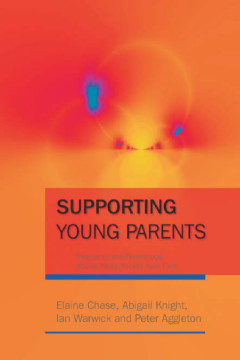
Additional Information
Book Details
Abstract
Invaluable in providing vivid illustrations of the strengths and needs of young parents who have been 'looked after' and, therefore of their children at the start of their lives. It illuminates policy and practice implications and points the way forward to what needs to be done to ameliorate their lives. Throughout, it presents its research in an accessible style and measured tone that make it difficult to put down.'
- Extract from the Foreword by Ann Phoenix, Co-Director of the Thomas Coram Research Unit, Institute of Education, University of London
Supporting Young Parents explores early pregnancy and parenthood from the perspectives of young men and women in and leaving care.
Most discussion about teenage pregnancy and parenthood focuses on the negative consequences for teenagers and their children. Yet, for some young people, particularly those who have been disadvantaged in life, early parenthood may offer the security of a family life, a sense of stability and an opportunity to build emotional attachments.
This book draws on authoritative research into the reasons for and experiences of pregnancy and parenthood among young people from local authority care. It questions the assumptions that early parenthood always limits young people's choices and opportunities and examines the types of support most likely to enable successful parenting.
This book will be essential reading for community nurses, health visitors, social workers, academics and students working in the fields of health, education and social care.
Elaine Chase is a senior research officer at the Thomas Coram Research Unit at the Institute of Education, University of London. She has worked as a practitioner and researcher promoting the health and well-being of children and young people, both in the UK and internationally for the past 17 years. The main focus of her research is the health and well being of children and young people, especially those who are at risk of marginalisation and disadvantage. Ian Warwick is also a senior research officer at the Thomas Coram Research Unit, at the Institute of Education, University of London. He has worked in the field of sexual health and young people since 1986, developing training materials for use with young people, conducting research on health and well-being and supporting professional development. Abigail Knight has been a researcher at the Institute of Education, University of London since 1995. Her research interests include the health and wellbeing of looked-after children and young people, disabled children and their families, and children's rights. Peter Aggleton is Professor in Education at the Thomas Coram Research Unit at the Institute of Education, University of London. Peter is the author and editor of over 30 books, and has worked internationally on young people, well-being and health for over 20 years.
…invaluable in providing vivid illustrations of the strengths and needs of young parents who have been 'looked after' and, therefore of their children at the start of their lives. It illuminates policy and practice implications and points the way forward to what needs to be done to ameliorate their lives. Throughout, it presents its research in an accessible style and measured tone that make it difficult to put down.
Extract from the Foreword by Ann Phoenix, Co-Director of the Thomas Coram Research Unit, Institute of Education, University of London
Table of Contents
| Section Title | Page | Action | Price |
|---|---|---|---|
| 1. Why do the poor reject aid? Mistakes and Misconceptions that Commonly Lead to Failure | |||
| 2. Who are ‘The Poor’? Understanding the Audience/s for Development Aid | |||
| 3. My Village’s Name Will Be Up in Lights: Designing for communal cultures | |||
| 4. Knots and Cages: The Myriad Problems of Reaching the Excluded | |||
| 5. Selling the new: making change attainable and attractive | |||
| 6. Building on what exists: hidden infrastructure & scaled up solutions | |||
| 7. Who Decides, Who Acts? Shifting the Power in Participative Development | |||
| 8. Setting Participative Development Goals |
